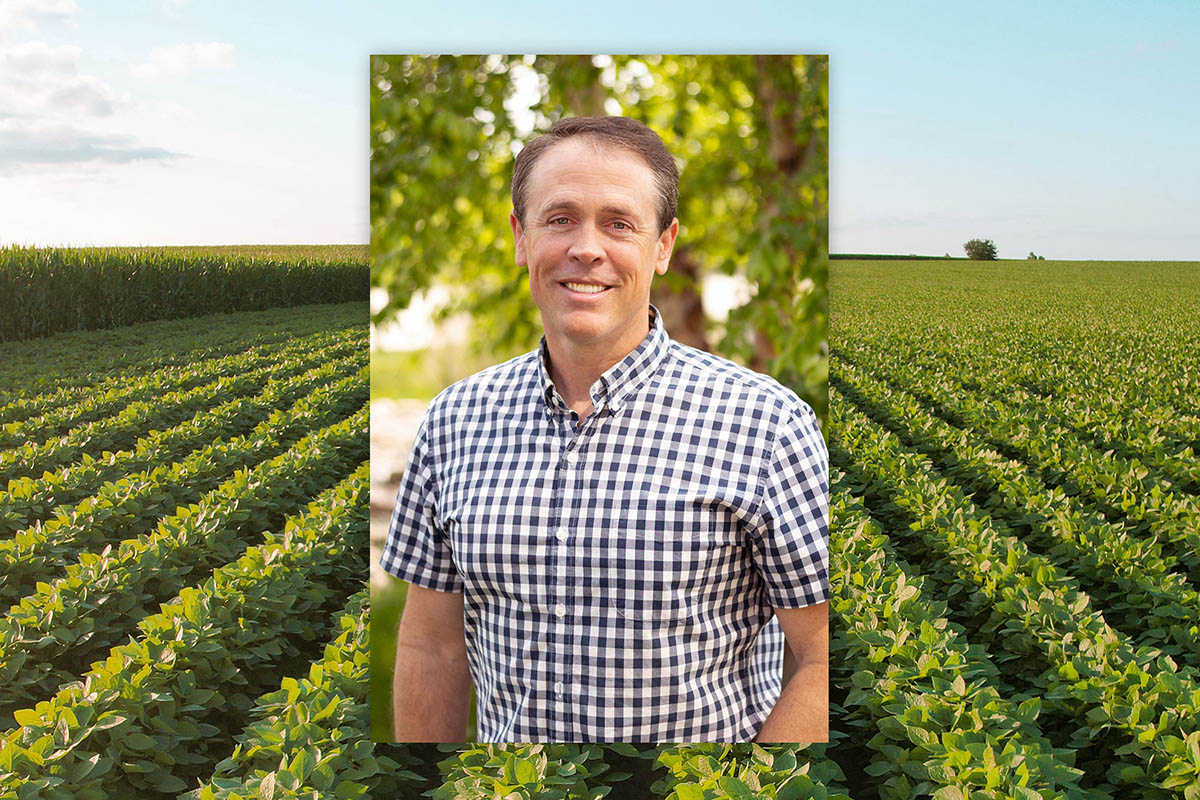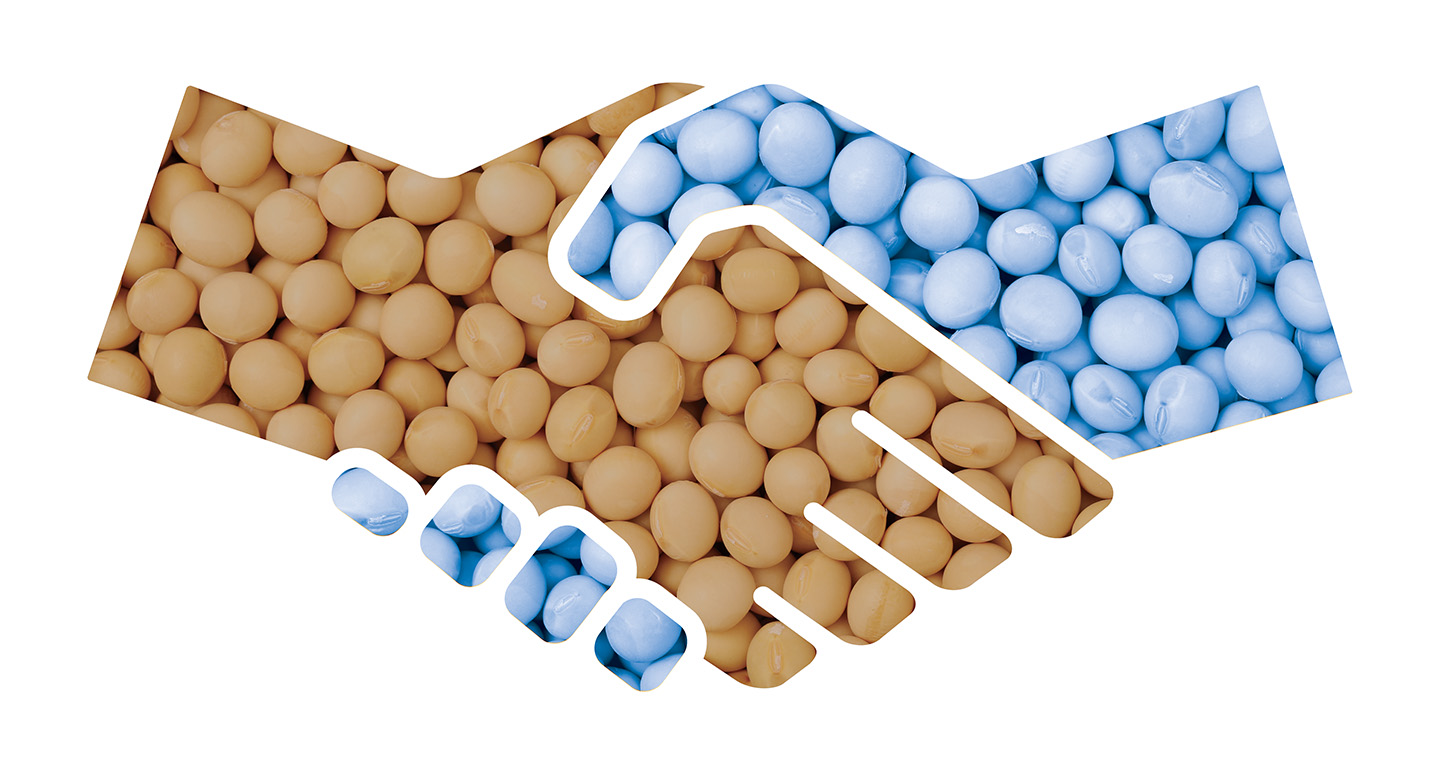
Grant Kimberley, ISA senior director of market development. (Photo: Iowa Soybean Association / Joclyn Bushman)
Collaborations extend soy's reach
August 1, 2023 | Kriss Nelson
Powered by the soybean checkoff, the United Soybean Board (USB) has a strategic vision to partner to deliver sustainable soy solutions to every life, every day. From food to candles and tires to adhesives, soy is vital in various components of feeding and fueling the world.
“I am very proud of how our checkoff investments have been used and what they have accomplished,” says April Hemmes, ISA District 2 director who also serves as a USB director and chair of USB’s demand action team. “We have an impressive story to tell about sustainable soybean production, and many organizations seek to partner with the soybean industry.”
Creating partnerships helps develop the soy market, maximizing farmers’ return on investment.
“Checkoff dollars promote and grow markets that help create customer preference for soy and soy products,” says Grant Kimberley, ISA senior director of market development.
Making an impact
U.S. soy offers many ways to reduce environmental impact, a key priority noted among consumers and businesses, says Karen Edwards, a USB consultant working on expanding soy’s prominence.
However, Edwards notes there is “no bio-based field of dreams.”
“Just because you build a bio-based product, it does not mean just anybody is going to buy it,” she says.
Edwards and the USB team build demand and highlight the products’ advantages over traditional products.
“These partnerships — thanks to U.S. farmers through their checkoff dollars — have invested in so many exciting new uses,” she says.
Goodyear tires are a prime example. USB and Goodyear partnered on research in 2011. The soy checkoff breakthrough investment led to tires with soybean oil as a replacement for petroleum oil. Goodyear won the prestigious Tire Technology International Award for Innovation and Excellence in the “Environmental Achievement of the Year” category in 2018.
“Now, we have major cities rolling on soy, thanks to Goodyear for sticking with the research and bringing it to commercialization,” Edwards says.
Hemmes talked tires in Los Angeles in 2022 to Goodyear’s local fleet leaders to help them understand the value of soy for the sustainability and performance of the tires. During the visit, USB and a fleet organization partnered to teach fleets about biodiesel and soy-biobased products, such as Goodyear’s soy oil-based tires.
They discovered the tires were an excellent fit for their fleets and performed better than traditional tires.
“Not only does this partnership bring the sustainability of soy to light, but we get to tell our story on how we raise our crops to people who have never been on a farm,” she says.
To have a major metropolitan area, such as New York City or Washington, D.C., try a bio-based product is no simple task.
“We have found common ground with major cities that were unaware of the sustainable solutions U.S. soy offers,” Edwards says.
Edwards is awaiting final approval from a deputy commissioner of New York City for a trial of soy-based asphalt developed by Iowa State University and marketed by Ames-based Colorbiotics.
Cleaner cities
The U.S. Department of Energy’s Clean Cities Coalition, made up of 75 cities, works to promote affordable, domestic transportation fuels and energy-efficient mobility systems.
Edwards and her team took a unique approach with the Greater Washington Region Clean Cities Coalition. They pointed out that while B20 and B100 blends of biodiesel power their fleets, why not use a soy-based road for the nation’s capital city, too?
As these partnerships take time, they patiently await a response to move forward.
“Farmers have long invested in biodiesel, which has started cities down a path of recognizing soy as a benefit,” says Edwards.

Decreasing health risks
USB has partnered with the American Lung Association to provide a Biobased Academy to further soy-biobased products in vehicle fleets.
This program educates employees about bio-based products’ operational, health, safety and environmental benefits.
“Once the American Lung Association trains staff, they see the value of U.S. soy, not only for sustainability goals but for the benefit of their employees,” says Edwards. “They are trying to reduce employees’ exposure to harsh chemicals, and soy is a great part of the solution.”
The success of this partnership is exemplified at the University of Virginia. After participating in the training, the university is switching to soy-based tires and looking into other soy-based products.
A purr-fect product
A partnership between USB and the Yield Lab Institute created the Soy Innovation Challenge, encouraging applicants to find nontraditional ways to use soybean meal.
One of the four finalists was “SoyKitty,” an innovative pet company that creates premium companion animal products that are safer for people, pets and the planet. The company offers a nontoxic cat litter made from soybean hulls for environmentally conscious cat owners.
“It’s amazing what one little soybean can do,” says Hemmes. “The company’s product is still in development but should be in production soon.”
Soy-based fire suppressants
One recent partnership aims to fight fires with soy.
“This could be a win for everyone,” says Edwards.
Soy protein replaces the per- and polyfluorinated alkyl substances (PFAS), also known as “forever chemicals” in traditional fire suppressants to offer safer solutions to firefighting.
“Federal and state governments want safer alternatives to protect firefighters and those who live in communities where they spray those chemicals,” Edwards says. “We hope the product passes through the extensive and rigorous testing required to bring it to market soon.”
Soy much momentum
Hemmes served on the committee developing the strategic plan for USB, where partnerships received top billing.
“We asked the board what they would like to see, and one of the top responses was partnerships,” she says. “We know our checkoff investments go much further when we partner with others.”
Back